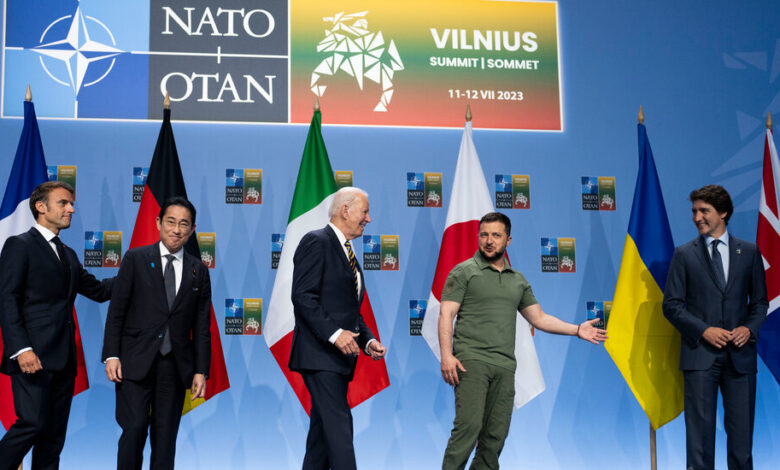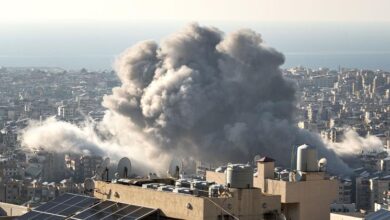As NATO convenes, leaders worry about a flaw at its heart

As President Biden and his aides plan to host NATO’s 75th anniversary celebrations, which kick off Tuesday evening in Washington, the goal is to project an air of confidence.
The message to President Vladimir V. Putin of Russia and other potential adversaries is that a larger and stronger group of Western allies has emerged from more than two years of war in Ukraine, more determined than ever to repel aggression.
But as 38 world leaders began arriving here on Monday, that confidence appeared to be in jeopardy. Even before the summit officially began, it was overshadowed by uncertainty about whether Mr. Biden would seek a second term and the looming possibility of a return to office by former President Donald J. Trump.
Mr. Trump has declared NATO “obsolete,” threatened to leave the alliance and, more recently, said he would let the Russians “do whatever they want” to any member country he deemed not contributing enough to the alliance. In recent days, as Mr. Trump has surged in the polls following the debate, key European allies have begun to discuss what a second Trump term might mean for the alliance—and whether it can confront Russia without American weapons, money and intelligence gathering at its center.
Mr. Biden will greet the leaders in the vast Andrew W. Mellon Hall a few blocks from the White House on Tuesday evening — the same room where the treaty establishing NATO was signed in 1949, in a ceremony presided over by President Harry S. Truman. Mr. Biden was 6 years old at the time, and the Cold War was still in its infancy.
He is now 81 and perhaps the most vocal advocate in Washington for an alliance that has grown from 12 members in 1949 to 32 today as the era of great power conflict has re-emerged. But when they gather Tuesday night, leaders will be watching Biden’s every move and listening to his every word for signals on what Americans are focused on — whether he can last another four years.
Biden knows that, and said in an interview with George Stephanopoulos on ABC on Friday that he welcomes the scrutiny. “Who’s going to keep NATO together like I do?” the president asked rhetorically. “I guess a good way to judge me,” he said, is to watch him at the summit—and see how the allies react. “Come listen. See what they have to say.”
As they arrived, NATO leaders acknowledged that the alliance was facing a test they had not anticipated: whether it could maintain momentum in support of Ukraine when trust in its most important player had never been more fragile.
And they know that Mr Putin and Xi Jinping, the Chinese leader, are also watching.
“NATO has never been, is not and will never be taken for granted,” Jens Stoltenberg, the alliance’s outgoing secretary general, said on Sunday during a wide-ranging discussion with journalists. “We have done it successfully for 75 years. I believe we can do it in the future. But it is about political leadership, it is about political commitment.”
Months before the meeting, the alliance began hedging in case Trump wins a second term as president. establish a new NATO command to ensure a long-term supply of weapons and military aid to Ukraine even if the United States, under Mr. Trump, withdraws.
But in conversations with NATO leaders, it is clear that their plans to modernize their forces and prepare for an era that could be marked by decades of confrontation with Russia are not being matched by commensurate increases in military budgets.
More than 20 NATO members have now met the goal of spending 2 percent of their gross domestic product on defense, fulfilling promises some made in response to Mr. Trump’s demands and others made in response to the reality of Russian aggression. That percentage—a target set more than a decade ago, in an era when terrorism seemed the greatest threat—seems small compared to the task at hand, many Biden aides say.
In Europe, Germany has outlined plans to upgrade its military capabilities to deter Russian aggression, a transformation promised by Chancellor Olaf Scholz in the weeks after Russia’s invasion. But Mr Scholz’s grand plans have yet to be balanced with a budget to pay for them, and the politics of getting the public to go along have proved so fraught that German officials are reluctant to put a price tag on them.
Carl Bildt, co-chair of the European Council on Foreign Relations and former prime minister of Sweden, recently written that European countries “will need to double” their budgets “again to be able to credibly deter threats from an increasingly desperate Russian regime.”
Despite that, White House officials said Monday that Mr. Biden would not push for new military spending targets.
But the more pressing issue for Mr Biden and Mr Scholz is avoiding another public spat with President Volodymyr Zelensky of Ukraine over the question of how to describe the country’s eventual accession to NATO.
Last year, when he traveled to Vilnius, Lithuania, for NATO’s annual meeting, Mr. Zelensky expressed his displeasure at the lack of a timetable for Ukraine’s accession to the alliance. “It is absurd and unprecedented that no timeframe has been set, neither for the invitation nor for Ukraine’s membership,” he wrote on social media at the time.
He was temporarily appeased when the alliance pledged that Ukraine could skip some of the procedures other countries must go through before they can join.
But for months now, NATO countries have been negotiating language that could address the issue without risking allowing Ukraine to join while it is still technically at war.
In recent weeks, negotiators have begun to agree on a new approach: Diplomats involved in the talks said the alliance is expected to declare Ukraine’s accession to NATO “irreversible.”
While “irreversible” sounds solid, it does not address Mr Zelensky’s core demand — the date when his country would come under NATO protection.
Mr Zelensky’s case is clearly the worst. But it is not the only one.
Seventy-five years after NATO was created to deter threats from the Soviet Union at the beginning of the Cold War, some current and likely future leaders among the alliance’s member states appear sympathetic to Russia’s diplomatic appeals despite Moscow’s invasion of Ukraine.
Prime Minister Viktor Orban of Hungary visited Russia the day before yesterday, and in public statements alongside Mr Putin, he said nothing to condemn their invasion, or continued attacks on civilians. He alluded to finding an opening for peace talks on terms similar to those demanded by Russia.
The White House criticized the visit on Monday. John F. Kirby, a spokesman for the National Security Council, said Mr. Orban’s visit “certainly does not appear to be productive in trying to get things done in Ukraine,” adding, “It’s troubling.”
But to avoid any public divisions within NATO on the eve of the summit, Mr Stoltenberg did not criticize Mr Orban, noting that “NATO allies interact with Moscow in different ways, at different levels.”
But he said that trying to reach a solution while Mr Putin was moving into Ukraine would ultimately not bring peace. “We all want peace,” Mr Stoltenberg said. “It is always possible to end a war by losing a war. But that will not bring peace — that will bring occupation, and occupation is not peace.”




